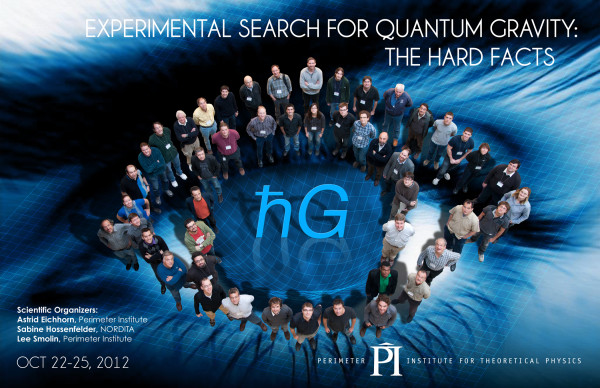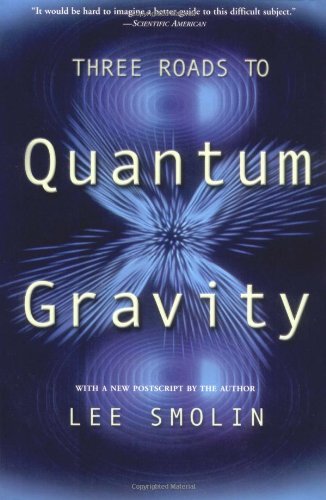If we want to understand the Universe at a fundamental level -- all the forces on all scales -- the biggest obstacle facing us is to come up with a correct, consistent, testable and verifiable theory of quantum gravity. To no one's great surprise, we're not quite there yet.
In 2001, Lee Smolin -- one of the leading thinkers in quantum gravity -- made the bold prediction that,
“We shall have the basic framework of the quantum theory of gravity by 2010, 2015 at the outside.”
While we're not at all there yet, it's still fascinating in its own right to take a look at where we actually are. In an exclusive interview, Sabine Hossenfelder gets Lee talking about the state of the field, where we've come, and what we have left to do.
 Image credit: Perimeter Institute for Theoretical Physics, 2012. Via https://www.perimeterinstitute.ca/conferences/experimental-search-quant….
Image credit: Perimeter Institute for Theoretical Physics, 2012. Via https://www.perimeterinstitute.ca/conferences/experimental-search-quant….
Go read the whole, fascinating story over at Starts With A Bang on Medium!


This article, and great Lee Smolin, made me a happy camper today :) Thanx Sabine.
I say "great" Lee Smolin, because IMO he's perhaps one of the last in the breed of physicists/philosophers. Sagan, Feynman, Einstein, Oppenheaimer etc.. were in that group, nowdays, sadly there's not many.
There was a great written discussion some years ago between Smolin and Suskind on the enthropic principle. It's available on arXiv with some search involved. Smolin, ever so elegantly, reminded Suskind what "science" should be and clearly showed what pitfalls are in front of those who think "i don't need experiment, my math is enough"... (not that Suskind ever changed his mind, of course. :) And with due credit, Suskind's open standford lectures are still one of the best on cosmology that you can watch for free :) ).
But Smolin is someone i hold in great esteem. Much more so then "pop" scientists like Carrol or Kaku and others in that group (Philipenko excluded.. his just great), who are more concerned with tv ratings then actual scientific work.
@Sinisa Lazarek #1
I haven't read this article yet, or any on Starts with a Bang recently. Really busy with work, but I have enough time to dump on Michio Kaku.
I really wanted to like that guy. He's got a great demeanor and looks like a smart guy. Shows about robots and the future often have him as a fixture, and who doesn't love that? Then I caught him as a guest in a segment on some news program talking about how global warming caused some major snowstorm that hit New York.
That in itself isn't a problem. There are a LOT of really smart people who believe in global warming. I certainly don't cross people off my list of worth listening to if they fall in that camp, but the particular mechanism Michio Kaku had said was responsible for the storm was completely inaccurate in a very basic way. A reasonably informed high school student could have done better.
It was then that I realized the Michio Kaku is just a celebrity. If some producer at CNN wants a smart guy to opine on a topic, they call Michio Kaku. It doesn't matter if it is in his field of expertise or not. If they're paying, he'll play the part. It didn't seem to matter to him on that day that everyone who listened to him, and trusted him, came away misinformed about a process that is really well understood. I view that as a violation of trust, and that is much harder for me to overlook.
Sabine articles kick ass! I'm loving all the attention on Quantum Gravity.
Although I understand practically none of it, I'm pulling for LQG, or Causal Sets, or something with Discrete Spacetime. I want my Absolute Space back. Relativistic Continuous Spacetime hurts my brain. Einstein was a smart dude, but it can't be turtles all the way down. That can't be the right answer.
What I find intriguing is that Smolin subtlety misrepresented his own position. It was only the follow up that left it subtle. I'm not going say anymore, because the only reason he'd do that is if he has had a big insight and....still in that anxious phase of thinking everyone else is going to see it because it's so obvious. Which it is, when you've seen it. But isn't when you haven't. And that's all just because big insights, I mean big ones, are always just so simple. Just looking again at exactly what's in front of you. Which is why when we get a magical moment, in the early phase we tend to feel a little paranoid and for a while take steps to at least not help everyone see it before we can get a handle on it at least. But, you know, in the end we calm down don't we. Because everyone is looking right at it, but not seeing it. Crazy. But there it is. Not there. There. No, that's broom cupboard. There. Oh forget it.
I'm better at history than science, and not very good at either, but it seems to me that the 'new physics' will be 'discovered' by a young scientist, as occurred in the past - e.g. Feynman as mentioned by Sinisa Lazarek at #1, or Schrodinger and Pauli, and especially Einstein. Maxwell was just 29 when he went to Kings College and published 'On Physical Lines of Force' a year later. It seems apparent that every now and again a brilliant young mind is required, and then even that brilliant young mind will find new breakthroughs harder to come by as he or she grows older.
We seem to be at one of those epochs now, awaiting the next young Newton or Einstein.
It also seems clear that connecting theory to experiment will only come at ever greater expense - larger colliders, more expensive telescopes, neutrino telescopes, gravity wave telescopes...
That's where scientists like Michio Kaku, Brian Greene, Brian Cox and Neil de Grasse Tyson come in - they connect the science to the constituents who have to vote for the funding. Ethan and Sabine are doing a great job too.
I'm convinced the breakthrough to new physics WILL come in due course, and the world will be just as enthralled as we were in 1687, 1905, and 1915.
Hope I'm still around to see it...
It is our knowledge and our egotistical ideals that in many cases are a barrier to understanding the truth.
Lee Smolin has no doubt that: "The continuous appearance of space is as much an illusion as the smooth appearance of matter. Were we able to observe the world on a small enough scale, we would see that space is made of things that we can count."
This idea of Lee Smolin is of course a belief only, but recently it has been proved mathematically. In fact, Exact Planck Length, namely (1/6)^37 µm (1.6158600×10^-35 m), as the smallest length in physics which has been derived from a realistic interpretation of quantum mechanics, is a key point that leads us to understand Quantum Gravity.
For more information refer to the following articles:
•“Exact Planck Length Unveils Quantum Gravity”, it is also accessible from the following link:
http://www.keepandshare.com/doc/5788557/exact-planck-length-unveils-qua…
•“A Discussion on the Theory of Everything”, it is also accessible from the following link:
http://www.keepandshare.com/doc/6605372/a-discussion-on-the-theory-of-e…